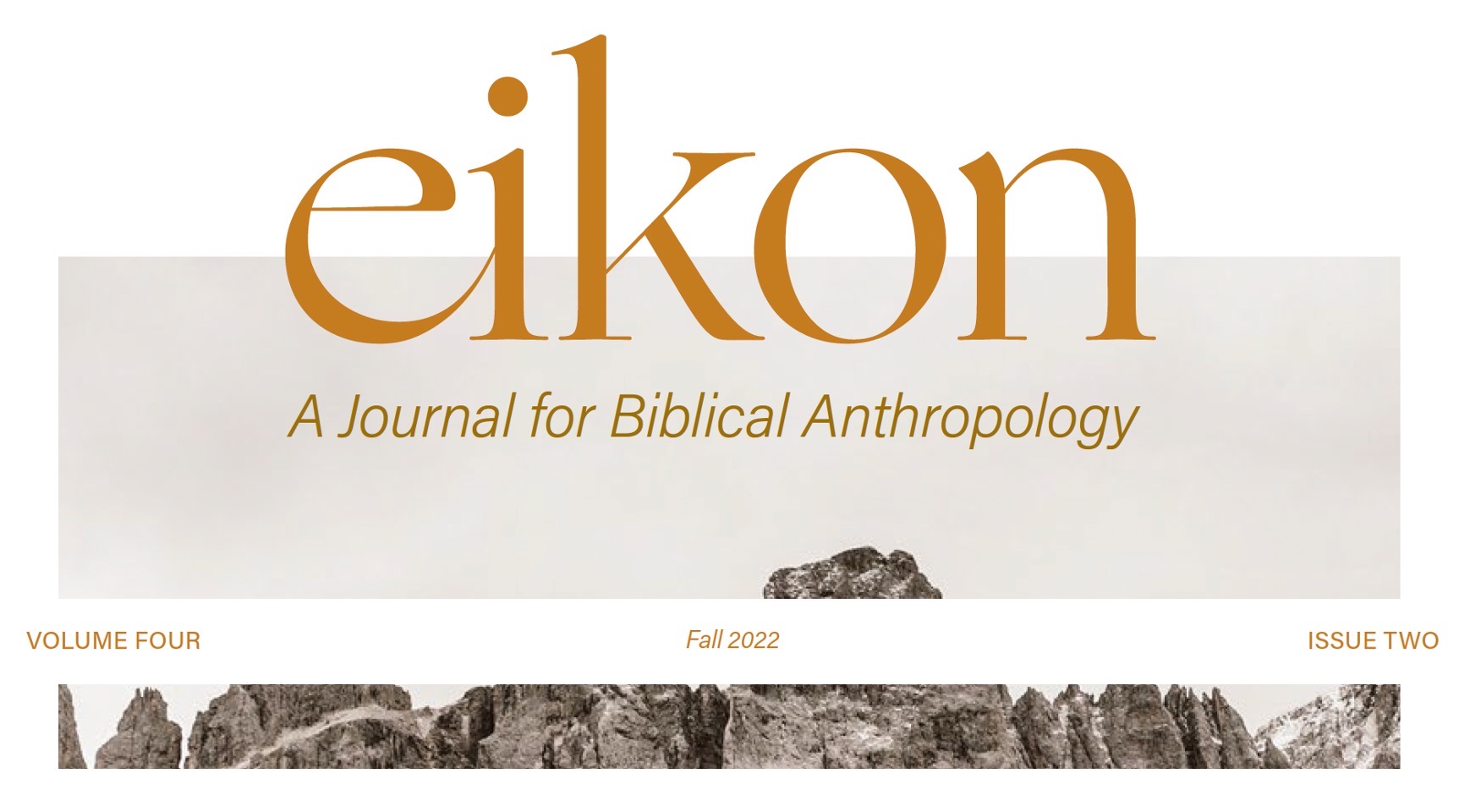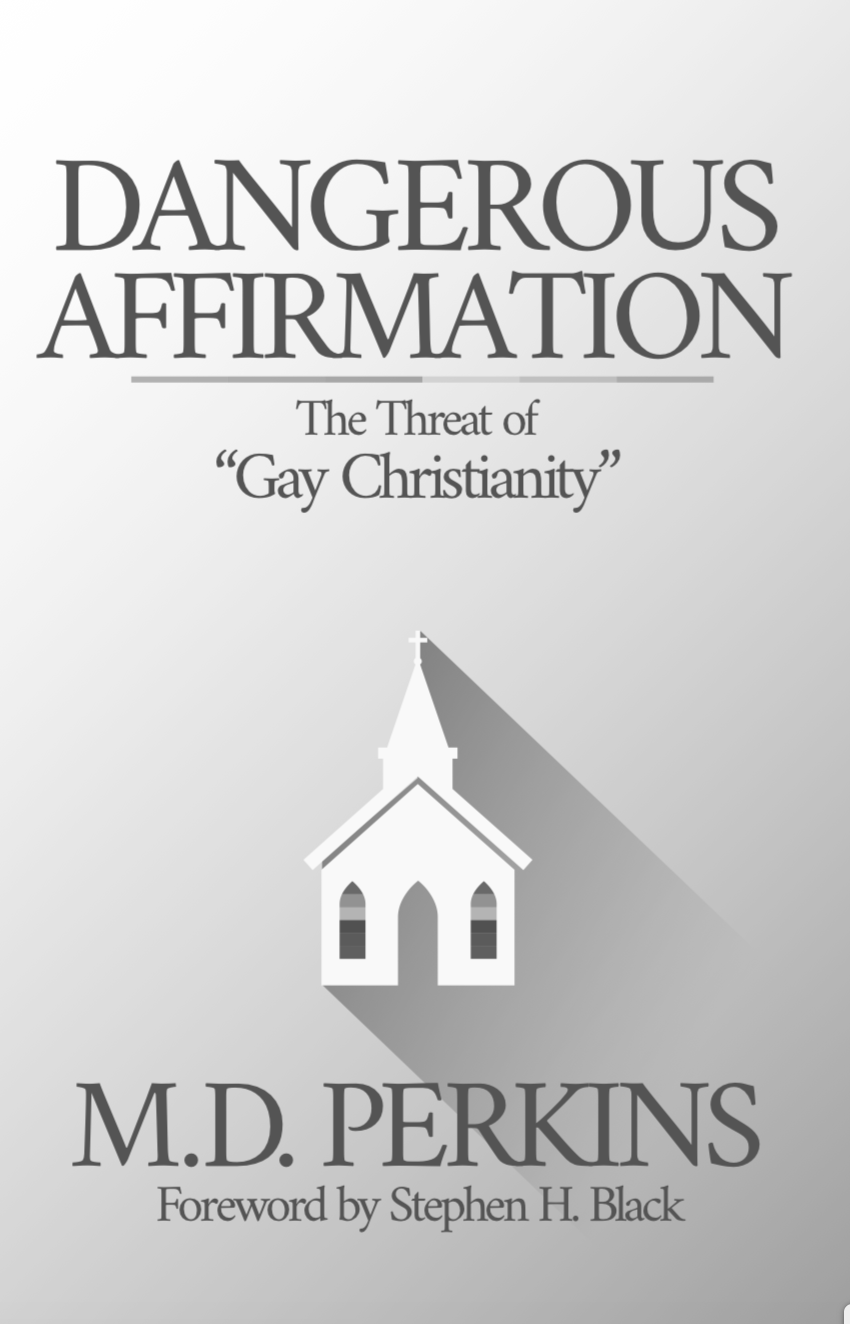Editors note: the following book review appears in the Fall 2022 issue of Eikon.

M. D. Perkins. Dangerous Affirmation: The Threat of ‘Gay Christianity.’ Tupelo, MS: American Family Association, 2022.
 While walking our dogs together last week, my neighbor Malcolm wanted to know why I do not support gay marriage. Did I not understand, he whispered, that it is part of the Fourteenth Amendment? The Fourteenth Amendment is one of the three amendments passed during Reconstruction to abolish slavery by granting citizenship and “equal protection under the laws.” I asked him how he knew that gay people were a protected category under the Fourteenth Amendment. I also asked him to stop whispering. He told me that people are born gay, that sexual orientation is genetic, and that denying gay marriage is the moral equivalent of supporting slavery.
While walking our dogs together last week, my neighbor Malcolm wanted to know why I do not support gay marriage. Did I not understand, he whispered, that it is part of the Fourteenth Amendment? The Fourteenth Amendment is one of the three amendments passed during Reconstruction to abolish slavery by granting citizenship and “equal protection under the laws.” I asked him how he knew that gay people were a protected category under the Fourteenth Amendment. I also asked him to stop whispering. He told me that people are born gay, that sexual orientation is genetic, and that denying gay marriage is the moral equivalent of supporting slavery.
Did I mention that Malcolm is a socially conservative history teacher at the local high school, a member of the local evangelical megachurch, and a life-long Republican?
How did we get to a place where gay marriage is considered a conservative constitutional value and a moral good?
We got here when segments of the evangelical church went along with the world’s deception and started to believe and teach the idea that sexual orientation (a nineteenth-century category mistake) and gender identity (a twentieth-century category mistake) are basic categories of personhood. A new measure of the man was born with these category mistakes. Whereas the Bible records two kinds of people — men and women — “Gay Christianity” has added a third: gay people. And with “gay people” come all the other letters in the alphabet soup, LGBTQ. And do not forget the + sign. We have arrived at a place where common knowledge proclaims that sexual orientation is immutable and biological sex is a matter of psychological choice. Malcolm and whole segments of the broad evangelical church agree.
D. Perkins, author of Dangerous Affirmation, is a Research Fellow of Church and Culture for American Family Association, and a Ruling Elder in the Presbyterian Church in America (PCA). Perkins’s denomination is hotly divided by the heresy of “Gay Christianity,” for now, in its Side B/Celibate variety. Perkins’s book sounds the alarm from a faithful Christian husband and father who knows first-hand the dangers of allowing “Gay Christianity” to flourish without rebuke. Dangerous Affirmation: The Threat of “Gay Christianity” explains why “Gay Christianity” is not a mere fringe movement but rather a “dangerous leaven.” Perkins is best known for his film productions The God Who Speaks (2018) and In His Image: Delighting in God’s Plan for Gender and Sexuality (2020). But in addition to film production, in 2021, Perkins published a free eBook entitled A Little Leaven: Confronting the Ideology of the Revoice Movement.[1] M. D. Perkins, a gentle family man with an easy-to-follow speaking and writing style, is quickly emerging as the go-to first-responder of biblical faith against the heresy of “Gay Christianity.”[2]
Dangerous Affirmation is 222 pages of meticulously written analysis. Although the subject matter is weighty, Perkins’s writing is clear, concise, and pastoral. Because there is not one ponderous sentence in the book, it reads quickly. I read it in one (long) sitting. Indeed, I could not put the book down. Its five chapters serve as an apologetics map for how the false teaching of “Gay Christianity” has entered the church. Perkins opens with a helpful introduction, “What is ‘Gay Christianity’?” Chapter 1, “Rethinking Theology,” addresses the problems of Queer Theology and Gay Celibate Theology. Chapter 2, “Rethinking the Bible,” identifies the problems in rejecting the biblical foundation and biblical language of homosexuality. Chapter 3, “Rethinking the Church,” shows how “Gay Christians” use homophobia and the language of LGBTQ+ as weapons to demand the church “repent” of the Bible’s clear teaching. Chapter 4, “Rethinking Identity,” shows how the Freudian invention of sexual orientation is the wind under the sails of the “Gay Christian” identity. In this section, Perkins shows how deceptive these false teachers are, using a bait-and-switch with a biblical and secular ideology, something the Revoice movement has perfected. Finally, chapter 5, “Creating Activists,” addresses how bans on conversion therapy and the rejection of all change-allowing therapies for homosexuality have married the church to the world. Perkins is right. In all the best ways, this book made me squirm. And course-correct.
Perkins reads his opposition with kindness and gives the benefit of the doubt where it is warranted. There are no straw-man arguments in the book and no vendettas. As Perkins takes you through the primary texts of “Gay Christianity,” you see the hermeneutical process by which biblical concepts (being born again; fighting sin) are replaced by therapeutic ones (stewarding homosexuality; queer treasures in heaven). The Bible’s witness is that a repentant homosexual growing in sanctification is no longer a homosexual. But “Gay Christianity” teaches once gay, always gay. Instead of repenting and turning from sin, you merely “steward” and “navigate” it. “ Gay Christianity” denies the power of the resurrected Christ, the comfort of the Holy Spirit, and the election of God the Father to create new creatures in Christ. Instead, “Gay Christianity” believes either that Bible-believing Christians should repent from thinking that homosexuality is a sin (Side A) or repent from believing that God changes people (Side B).
 Perkins shows that the distinction between Side A (gay sex) and Side B (gay identity) is a permeable, pencil-thin line, not an impassable mountain. He identifies how Side B “Gay Christianity” sits atop a hefty list of intellectual and theological errors: it collapses distinct biblical categories (nature, grace, sin); it invents words or neologisms and then imputes them with theological force (aesthetic orientation, mixed orientation marriage); it makes allegiances with idolatry and idolators (Obergefell decision, Spiritual Friendship); it twists ideas and misrepresents primary texts (Greg Johnson, Still Time to Care);[3] and, celibate or not, it leads people to hell with a smile on their face and a Gay Pride sticker on their shirt. All this to say, “Gay Christianity” — the heresy that homosexual orientation is genetic, immutable, and morally good — is our generation’s scourge of Neo-Orthodoxy. “Gay Christianity” is many things, but Christian isn’t one of them. “Gay Christianity” is scurrilous slander against the cross of Christ.
Perkins shows that the distinction between Side A (gay sex) and Side B (gay identity) is a permeable, pencil-thin line, not an impassable mountain. He identifies how Side B “Gay Christianity” sits atop a hefty list of intellectual and theological errors: it collapses distinct biblical categories (nature, grace, sin); it invents words or neologisms and then imputes them with theological force (aesthetic orientation, mixed orientation marriage); it makes allegiances with idolatry and idolators (Obergefell decision, Spiritual Friendship); it twists ideas and misrepresents primary texts (Greg Johnson, Still Time to Care);[3] and, celibate or not, it leads people to hell with a smile on their face and a Gay Pride sticker on their shirt. All this to say, “Gay Christianity” — the heresy that homosexual orientation is genetic, immutable, and morally good — is our generation’s scourge of Neo-Orthodoxy. “Gay Christianity” is many things, but Christian isn’t one of them. “Gay Christianity” is scurrilous slander against the cross of Christ.
My only criticism of this book is Perkins’s handling of Dr. R. Albert Mohler Jr.’’s blog piece, “Sexual Orientation and the Gospel of Jesus Christ” (148).[4] Dr. Mohler, like others in 2014, used the neologism “sexual orientation” to refer to an unchosen pattern of sexual desire that seemed to have no outside influence. Dr. Mohler distinguished this term from “the sexual identity structure that so often goes with sexual orientation” and flatly rejected homosexual orientation as a personhood category, thus situating his use of this neologism outside of a “Gay Christian” application. Dr. Mohler identified that some would trace homosexuality to a sin nature in Adam and not external trauma. In 2014, there was growing tension between the reparative therapy community — which maintained that homosexuality has root causes in trauma or neglect — and the biblical counseling community — which argued that homosexuality had root causes in Adam’s fall and the sin nature that we inherited. In this piece, Dr. Mohler was offering a Reformed understanding of original sin as it applied to homosexuality.[5] Dr. Mohler consistently speaks against the heresy of “Gay Christianity.”[6]Here is my plea to M. D. Perkins and the rest of us: let’s stop shooting our own on the battlefield. Al Mohler and M. D. Perkins are on the same side of this debate. And always have been.[7]
Dangerous Affirmation: The Threat of “Gay Christianity” is published by American Family Association (AFA) and at the writing of this review is available exclusively on the AFA website.[8] For some, purchasing this book from AFA will pose an unwelcome change to the cushy, two-day, free Amazon Prime “shopping experience.” But as more books that proclaim actual biblical truth are canceled, we need to adjust to this new norm sooner rather than later.
Dangerous Affirmation is the definitive gold-standard book on “Gay Christianity.” Written with clarity, Christian integrity, Reformed theological foundations, and grace, it is a book every Christian can and should read. The sexual struggler will find hope. The moms and dads with children lost for now to LGBTQ+ indoctrination will find comfort and direction. The pastors who minister to people trapped in LGBTQ+ sins will find guidance. The elders who are considering hosting Revoice or launching special activities for “sexual minorities” will flee from idolatry. This book is a gem, reveling in the fact that repentance is a fruit of the Christian life. Because sin is not only a physical issue but a moral and ethical one, homosexual orientation is a sin, whether you act on it or not. Any movement such as “Gay Christianity” that erases sin on therapeutic terms or defends against repentance of unchosen sin because it is “spiritual abuse” is taking its playbook from Satan. And if the clarion call of Dangerous Affirmation sounds like culture war talk, you need to re-tune your ears. M. D. Perkins does not talk like a culture warrior. He talks like a Christian.
[1] https://resources.afa.net/a-little-leaven-ebook-by-md-perkins
[2] M. D. Perkins, “Responding to the Leaven of Revoice,” September 8, 2022, https://afa.net/the-stand/culture/2022/09/responding-to-the-leaven-of-revoice/
[3] M. D. Perkins, “What Greg Johnson Won’t Tell you About “Double Repentance.” The Aquila Report, February 23, 2022. https://theaquilareport.com/what-greg-johnson-wont-tell-you-about-double-repentance/. In this investigative essay, Perkins uncovers Greg Johnson’s dishonest use of scholarship where he purposefully inserts an ellipses to occlude and misrepresent the obscure author Richard Lovelace, using Lovelace to support an idea that he rejected. As Perkins helpfully points out, most of us do not have this obscure book on our bookshelves, but Perkins does. And he helpfully brought this act of academic dishonesty to light.
[4] R. Albert Mohler, “Sexual Orientation and the Gospel of Jesus Christ,” November 13, 2014, https://albertmohler.com/2014/11/13/sexual-orientation-and-the-gospel-of-jesus-christ.
[5] It turns out that both the change-allowing counseling community and the biblical counseling community were both right, and no war between the two should have been waged. I have publicly confessed my own sin in waging this war here in “Retraction of my Position on Reparative Therapy and Ex-Gay Organizations,”https://static1.squarespace.com/static/5a81dca7d55b41d51ee756c3/t/62cdd566fd9ed703c736fdb7/1657656678694/Retraction+FINAL+EDIT+PDF.pdf.
[6] Dr. Mohler wrote the introduction to and edited a collection entitled God and the Gay Christian? A Response to Matthew Vines (Louisville, KY: SBTS Press, 2014). He wrote the foreword to Denny Burk and Heath Lambert’s Transforming Homosexuality: What the Bible Says about Sexual Orientation and Change (Phillipsburg, NJ: P&R Publishing, 2015), a book that challenged the idea that sexual orientation was fixed, inborn, or immutable.
[7] One issue might be that Nate Collins, founder of Revoice and author of a foundation book of Revoice ideology, All But Invisible: Exploring Identity Questions at the Intersection of Faith, Gender, and Sexuality (Zondervan, 2017), graduated from Southern Baptist Theological Seminary, where Dr. Mohler serves as president. But if this is an issue, Mohler and Perkins are tit for tat, as Greg Johnson, the Presbyterian Church in America’s most infamous gay pastor, is Nate Collins’s co-laborer in advancing Revoice ideology. As of this writing, and even with presbyterian polity, the PCA has been unable or unwilling to apply church discipline to its Side B Gay Christian infestation.
[8] https://resources.afa.net/dangerous-affirmation-book
You, too, can help support the ministry of CBMW. We are a non-profit organization that is fully-funded by individual gifts and ministry partnerships. Your contribution will go directly toward the production of more gospel-centered, church-equipping resources.